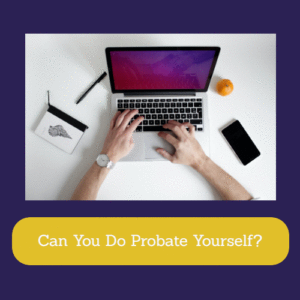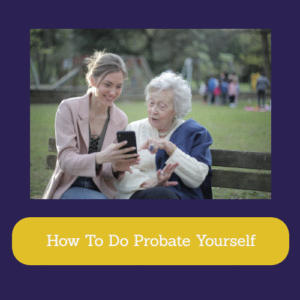 Can you do probate yourself? Yes, you can do probate yourself. There’s no legal requirement to hire a probate solicitor or any legal professional.
Can you do probate yourself? Yes, you can do probate yourself. There’s no legal requirement to hire a probate solicitor or any legal professional.
The big question is whether you should do probate yourself.
To be connected to a specialist probate solicitor near to where you live, please either call us now on 0845 1391399 or complete a Free Online Enquiry.
Here is everything worth considering before you start applying for probate with no legal expertise on your side:
What is probate?
Probate is the legal right to deal with the estate of someone who has passed away. To get this permission in most of the UK, you need to apply for a legal document called a Grant of Probate (in Scotland, it’s called a Grant of Confirmation). You also need to be an executor named in their will.
If there is no will, you are technically applying for a document called a Grant of Letters of Administration and to be the administrator of their estate rather than the executor.
Once you have successfully obtained probate, you have the right to access their bank accounts, sell any property, and generally handle their assets according to their will (or the Rules of Intestacy if there is no will).
Can I do probate without a solicitor?
Yes, you can do probate without a solicitor and many people do. If the estate is relatively simple, doing probate yourself can be the most cost-effective way to proceed.
That said, the process of applying for probate isn’t always straightforward. The role of executor or administrator of an estate comes with many responsibilities. It also opens you up to potential personal liability for any errors you make along the way. Even if you were trying your best.
Is probate difficult to do yourself?
This very much depends on the complexity of the estate.
You may be able to handle probate for a simple estate yourself. This would be the kind of estate with a low value or when all the property is owned jointly and the surviving partner will simply inherit everything.
When things like Inheritance Tax get involved though (the threshold for Inheritance Tax in the UK is currently £325 000), it becomes increasingly worthwhile considering getting at least some legal advice.
Should I do probate myself? Things to consider
There are a few vital issues to think about before you take on the challenge of doing probate yourself:
1) Paperwork
The job of applying for probate and then being executor or administrator of an estate involves a lot of paperwork. If you don’t find this easy, it’s important to prepare yourself or consider other options.
2) Legal complexity
The forms required to apply for probate can be completed by someone with no legal expertise.
However, working out things like who the beneficiaries of a will really are can be challenging. For example, what if a charity beneficiary has ceased operations since the will was written?
3) Personal liability
As the executor of the estate, you can be held personally liable for mistakes made during the administration.
For instance, if a creditor was not given sufficient time to claim repayment of a debt, you might have to cover that debt. You also have to ensure the correct Inheritance Tax is paid.
4) Obligation to notify creditors and pay debts
The estate is legally obliged to pay its bills. This might be actual bills, but may also be a mortgage or other debts.
As executor, you are obliged to give creditors a set period in which to step forward and make a claim on the estate. This can involve a great deal of investigatory work to track all debts down.
You are also obliged to advertise the death. This usually includes placing a death notice in The Gazette as well as other reasonable steps to spread awareness of the death.
5) Probate applications can be rejected
Though probate application forms can be completed by a layperson, they are not necessarily the easiest to understand for someone without a legal background.
Incorrect paperwork can lead to probate applications being rejected. You’ll then need to address these issues and apply again, usually leading to – at the very least – weeks and possibly months of delay.
6) Applications and actions can be contested
It is critical that you keep thorough records of your actions and the estate accounts if you are an executor. This is because the beneficiaries of the will have the right to contest any costs or actions they feel aren’t right.
When should I use a probate solicitor?
There are several circumstances in which it’s usually not a good idea to handle probate yourself:
- Relationship difficulties – trying to deal with the death of a loved one at the same time as complex legal affairs is unpleasant, leading many close relatives to stay clear of the probate process. The same is true if relationships between surviving family members are difficult.
- Complexity challenges – when there are many different assets, many different beneficiaries, or the estate has a large value, it gets progressively harder to be confident you’re meeting the legal responsibilities of an executor.
- Valuation or tax confusion – if Inheritance Tax needs to be paid, it’s an easy dividing line telling you it’s worth considering calling in legal expertise. The same is true of assets like property that need to be professionally valued if they’re not to be contested.
Can I start probate myself and then change my mind?
Of course, there’s nothing wrong with looking into the probate process a little to see if you feel you can handle it yourself and then calling in a probate expert to take over.
Doing probate yourself is often the most affordable way to handle the affairs of someone who has died. Yet probate solicitors and other specialists exist for very good reasons.
How about talking over your personal situation with an expert without any commitment?
Solicitors Near Me will find you a friendly probate specialist for free and with no obligation.
Tell us about the kind of advice you need today.
Probate Solicitors Near Me
To find a specialist probate solicitor near you, simply click the button below, enter a few details and we will soon connect you with a probate solicitor for FREE.
To be connected to a specialist probate solicitor near to where you live, please either call us now on 0845 1391399 or complete a Free Online Enquiry.

 Amidst the grief of the passing of a loved one, the complex legal process of probate is often the last thing you want to deal with. Yet it can minimise the costs associated with a death.
Amidst the grief of the passing of a loved one, the complex legal process of probate is often the last thing you want to deal with. Yet it can minimise the costs associated with a death. Do I need confirmation for a small estate in Scotland?
Do I need confirmation for a small estate in Scotland? Confirmation In Scotland – large estates
Confirmation In Scotland – large estates How Much Are Solicitors Fees for Confirmation In Scotland
How Much Are Solicitors Fees for Confirmation In Scotland